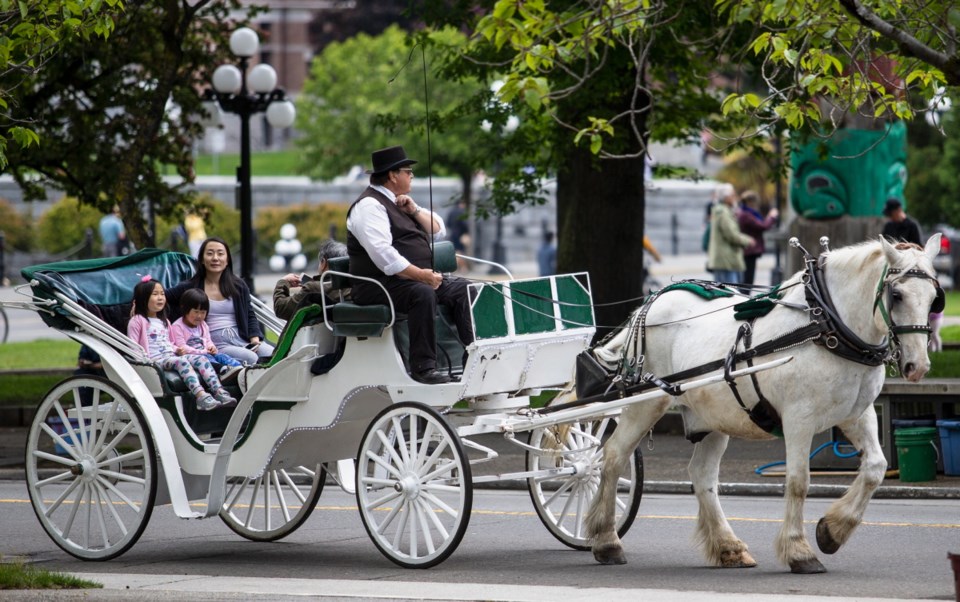Victoria’s horse-drawn carriage companies say they will take legal action seeking “millions of dollars in damages” if the city moves to ban their operations.
“What is not right is when somebody comes forward with their own principles and for no good reason tries to shut down businesses. That’s not okay,” said Donna Friedlander, owner of Tally-Ho and spokesperson for the local horse-carriage industry.
She said phasing out horse-drawn carriages “would be equivalent to sentencing our companies and our horses to a long drawn-out, complex and heart-wrenching death.”
Coun. Ben Isitt wants the city to develop regulations next year to phase out horse-drawn carriages by 2023. He cites rising temperatures and worsening traffic congestion among reasons for getting rid of the carriages.
Councillors voted at a committee of the whole meeting last week to put the carriage debate on hold while staff investigate the implications of such a move. A report is expected at council’s next quarterly update in September.
Friedlander said that even by asking for the report, council has already “materially and permanently damaged the reputation and long-term value” of the business.
“Delaying this decision to September will not only cost the city more time and money, it will inflict further injury by placing a dark cloud of uncertainty and stress over our operations, our staff, and local tourism for the entire peak summer season,” she said.
“It will also restrict our ability to continue making the long-term planning, financing, and investments that are required to maintain the welfare of our horses and quality of our services.”
Friedlander said the move by Isitt comes after council last year extended the operators’ lease for street parking by five years.
“So they’ve extended it for us based on all the evidence provided by industry and third party people coming in to say this industry in Victoria is actually very healthy and horses are well looked after,” she said.
The two companies that operate horse-drawn carriages, Tally-Ho and Victoria Carriage Tours, employ about 70 staff and are responsible for the care of 54 draft horses.
Should the industry be shut down, Friedlander said she would not be able to afford the estimated $20,000 a year it costs to keep each horse, she said. “The future of these horses is extremely uncertain and very worrisome. The rate of horses going to slaughter in Canada is shocking.”
She noted that almost 7,000 horses were shipped to Japan in 2014 to be slaughtered for meat.
“If people really care about our horses, they should be more concerned about the strong likelihood there is no happy ending for draft horses that no longer have a job to support their care.”
Friedlander said what is happening at council is having repercussions on the street. “We’ve seen a recent resurgence of verbally abusive attacks on our drivers by animal activists, which seem to have been triggered by the news of Coun. Isitt’s motion. These attacks are again putting drivers, horses, visitors and the public at serious risk,” she said.
Last year, a video of two harnessed horses struggling to find their footing, after they ended up lying on the pavement when the carriage they were pulling was bumped by a bus, prompted the B.C. SPCA to call for carriage operations to be prohibited from city streets and perhaps be restricted to park-like settings.
However, in a subsequent letter, B.C. SPCA CEO Craig Daniell said his organization would welcome “a solutions-based policy approach that reviews existing practices, barriers and opportunities for horse-carriage operations.”
A rally is planned at Victoria City Hall Thursday evening in support of the horse-carriage industry.
Isitt could not be reached for comment.



